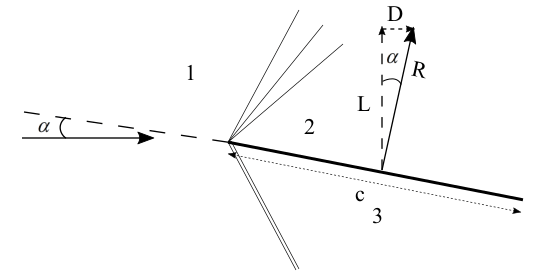RE: Find the lift and wave drag coefficients for an infinitely thin flat plate.
Find the lift and wave drag coefficients for an infinitely thin flat plate at an angle of attack of 8^{\circ} in a Mach 3 flow.
 Supersonic flow over a thin flat plate at an angle of attack
Supersonic flow over a thin flat plate at an angle of attack
From the \theta -\beta -M relationship, for \theta = 8^{\circ} and M = 3, \beta =25.611^{\circ}
Therefore,
M_{n1}=M_{1}Sin\beta =3Sin\left ( 25.611^{\circ} \right )=1.297
From normal shock properties, for M_{n1}=1.297, \frac{p_{3}}{p_{1}}=1.796
From isentropic flow properties, for M_{1}=3, \left ( \frac{p_{1}}{p_{01}} \right )=0.02722
From prandtl-Meyer function for M_{1}=3, \nu _{1}=49.76
Therefore, \nu _{2}=\nu _{1}+\theta =49.76^{\circ}+8^{\circ}=57.76^{\circ}
For, \nu _{2}=57.76^{\circ}, M_{2}=3.452
For, M_{2}=3.452, from isentropic flow properties
\left ( \frac{p_{2}}{p_{02}} \right )=0.01404
Therefore,
\frac{p_{2}}{p_{1}}=\left ( \frac{p_{2}}{p_{02}} \right ) \left ( \frac{p_{02}}{p_{01}} \right )\left ( \frac{p_{01}}{p_{1}} \right )=\left ( 0.01404 \right ) \left ( 1 \right )\left ( \frac{1}{0.02722} \right )=0.5158
Total pressure is constant through the expansion wave, p_{02}=p_{01}.
For, a thin flat plate lift per unit span is L{}’=\left ( p_{3}-p_{2} \right )\left ( c \right )cos\alpha
also, c_{l}=\frac{L{}’}{q_{1}S} =\frac{L{}’}{\frac{\gamma }{2}p_{1}M_{1}^{2}c} =\frac{\left ( p_{3}-p_{2} \right )\left ( c \right ) cos\alpha }{\frac{\gamma }{2}p_{1}M_{1}^{2}c} =\frac{2}{\gamma M_{1}^{2}}\left ( \frac{p_{3}}{p_{1}}-\frac{p_{2}}{p_{1}} \right )cos\alpha
\Rightarrow c_{l}=\frac{2}{\left ( 1.4 \right )\left ( 3^{2} \right )}\left ( 1.796-0.5158 \right )cos\left ( 8^{\circ} \right )=0.20123
For a thin flat plate, drag per unit span is D{}’=\left ( p_{3}-p_{2} \right )\left ( c \right )sin\alpha
also,
c_{d}=\frac{D{}’}{q_{1}S}=\frac{D{}’}{\frac{\gamma }{2}p_{1}M_{1}^{2}c} =\frac{\left ( p_{3}-p_{2} \right )\left ( c \right ) sin\alpha }{\frac{\gamma }{2}p_{1}M_{1}^{2}c} =\frac{2}{\gamma M_{1}^{2}} \left ( \frac{p_{3}}{p_{1}}-\frac{p_{2}}{p_{1}} \right )sin\alpha
\Rightarrow c_{d}=\frac{2}{\left ( 1.4 \right )\left ( 3^{2} \right )}\left ( 1.796-0.5158 \right )sin\left ( 8^{\circ} \right )=0.02828



